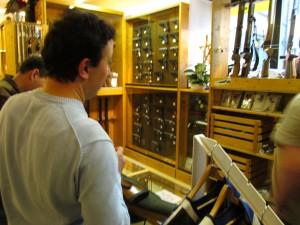As gun control debate rages, Switzerland offers interesting correlation — but is it real?
Gunsmith Daniel Wyss in Burgdorf, Switzerland, advises a customer wanting a scope to work with his rifle. (Photo by Tony Ganzer.)
While Washington debates what to do about guns, some gun advocates are looking abroad, to Switzerland, for inspiration.
They point to Switzerland, with its high gun ownership rates, low crime and lots of freedom as a model of what the United States should be.
But some Swiss reject the comparison. After a long-weekend, Daniel Wyss’ gun shop in a village near the Swiss capital Bern, buzzed with sportsmen and gun enthusiasts eager to re-arm.
Wyss said his customers are hunters, sportsmen, collectors and folks who want to protect themselves. In that respect, Swiss gun enthusiasts seem similar to their U.S. counterparts.
But Jo Lang, vice president of the Swiss Green Party and a survivor of Switzerland’s worst shooting tragedy, when a gunman shot 14 people in a state legislature in 2001, said there is one big difference. And he’d like to see the difference remain.
“In the United States you have a weapon to defend yourself, your home, your garden, your wife, your children; even the dog and the cats. This tradition doesn’t exist in Switzerland,” he said.
Swiss law requires men to enlist in the military or do national service by age 25. Women can choose to enlist. This compulsory military service generally means much of the population knows how to handle guns.
“In Switzerland to be a citizen and to have a weapon were very, very linked with community, or with the nation,” Lang said. “It was not linked with your garden or your family.”
But gun control has steadily increased in Switzerland, moving from little to no restrictions, to a permitting system and gun owner registries.
And even in Switzerland, there is debate over whether more restrictions should be put in place. The debate was renewed this month, when a gunman with a history of psychiatric treatment killed three people.
“If you have an incident as Newtown, or Winnenden, or Dunblane, then the politicians come and they cry as crazy, and they make a policy to prove to people, ‘We are here, and we understand you, and we will enforce the law,’” said Hermann Suter, vice president of proTell. “But in fact, you never will be able to avoid such tragedies.”
Though Suter calls proTell a sister organization to the NRA, there are major differences between the organizations. He said the Swiss have been compromising on more stringent gun rules for more than 10 years, including limiting access to ammunition.
“In a reasonable way, you have to do both. You have to have normal gun control, and you have to have reasonable ammunition control. I think with the actual law we have in Switzerland we fulfill these two points. The most important point is the point of the society,” Suter said.
Suter thinks the Swiss military tradition, and gun education from a young age, are important in a country with a strong gun culture.
Estimates put the number of guns in Swiss homes at between 2.3 and 4.5 million out of a population of 8 million. The vast majority are military-issue rifles, bought by soldiers after they finish their service.
Gun advocates in the United States have argued that crime is low in Switzerland because there are more guns. And it’s true there are few shooting deaths.
But Roger Schneeberger, secretary general of the State Police and Justice Directors Conference, said it doesn’t seem that guns are a deterrent to crime, in Switzerland.
“If you see the development of the number of burglaries in Switzerland this is a very negative trend — we have more and more every year,” he said. “And if burglars would think ‘there is a weapon in every house, I shouldn’t go to a Swiss house for a burglary,’ these wouldn’t be the figures we have recently.”
Schneeberger said, from a police perspective, fewer guns equal fewer risks for officers.
Rather than prevalence of guns, Schneeberger points to a well-integrated healthcare system as being a major asset in preventing shootings.
Wyss agreed. Fewer people fall through the cracks in Swiss society compared to a place like the United States, he said, suggesting that may be why gun crime is rare there. Wyss, and many in Switzerland, think the trend toward tighter restrictions on guns and ammunition will continue, and certainly not reverse.
And he accepts that.
